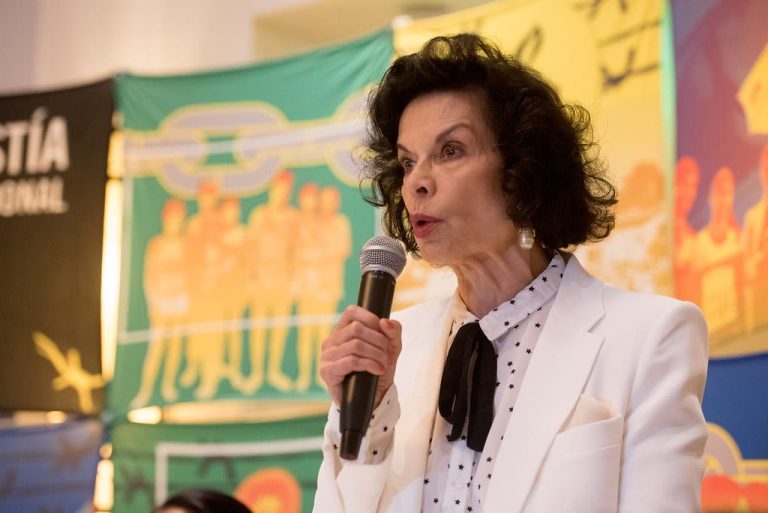17 de diciembre 2022

Children of Exile: The Births “Sowing Hope” in the Camp of Nicaraguan Farmers

PUBLICIDAD 1M
PUBLICIDAD 4D
PUBLICIDAD 5D
The human rights activist pointed out the need to go beyond dialogue and sanctions with a regime that is committing crimes against humanity

Bianca Jagger, president of the Bianca Jagger Human Rights Foundation. Photo: Confidencial
Nicaraguan-born human rights activist Bianca Jagger spoke before the US House of Representatives’ Tom Lantos Human Rights Commission on December 15, offering her perspective on the country’s crisis. She alleged that the road of dialogue is unworkable with “a regime that is committing crimes against humanity.” In consequence, she demanded that both President Joe Biden and Pope Francis show “greater firmness” against the regime of Daniel Ortega and Rosario Murillo.
Jagger explained to the legislators that she’s implored Pope Francis to issue a condemnation of the Nicaraguan dictator and intercede in favor of Monsignor Rolando Alvarez, bishop of Matagalpa and apostolic administrator of the Esteli diocese. The religious leader is currently under house arrest, accused of conspiracy and spreading fake news, and the Pope’s response to the situation has been that “a dialogue with the country is necessary.”
“As a human rights advocate, I’ve believed my whole life in following the road of dialogue,” Jagger told the Congressional committee. However, she clarified, this is possible only when there are “some possibilities [for sincere dialogue], not when it’s a matter of a regime that’s committing crimes against humanity. Every day [the Nicaraguan regime] increases its persecution against the people’s Church and continues the tortures it practices against the political prisoners.” The committee session was set up to discuss “the dangerous state of religious liberty in Nicaragua.”
The activist, who was born in Managua, recalled that during this year alone Ortega and Murillo expelled the Apostolic Nuncio, Waldemar Sommertag; outlawed and expelled 18 nuns from Mother Teresa’s order the Missionaries of Charity; and cancelled the licenses of a dozen Catholic Church media outlets. In addition, they’re currently holding 11 priests in jail cells, as well as Bishop Alvarez in house detention.
Bianca Jagger not only questioned the path of dialogue, but also the sanctions imposed by the Biden administration. The US government has included Nicaragua on a blacklist of countries that violate religious liberty, has prohibited hundreds of regime functionaries from entering the US, and has heavily sanctioned the mining industry.
Jagger has criticized the imposition of economic sanctions on the country for years. She told the Committee she’d reached the conclusion that Nicaragua has become “a gigantic jail, where people are suffering,” and “a terrorist State” that “persecutes anyone who dares to question what they’re doing.”
She asked the legislators to go beyond sanctions and not forget about her country, “although it’s small and doesn’t have oil resources.” Nicaragua, she reminded them, “is important from a geopolitical point of view,” due to the Russian military presence.
Democratic congressman James McGovern of Massachusetts agreed with her that “sanctions are a tool but not a solution.” Nonetheless, he pointed out: “we impose sanctions and that’s all. Nothing changes, people keep suffering.”
McGovern supports applying the principle of reciprocity to Managua, where last October the Ortega regime refused to accept Hugo Rodriguez, the new US Ambassador appointed by Washington.
Eddy Acevedo, advisor for the Wilson Center, who also participated in the session, proposed that – in addition to expelling Nicaragua’s ambassador to the US – the country should use its vote and influence to block loans to Nicaragua, “unless they promote democracy.”
Since 2018, according to Acevedo’s estimates, Ortega has obtained 1.2 billion dollars in loans from the International Monetary Fund, the World Bank and the Inter-American Development Bank.
Another of Acevedo’s recommendations was to expel Nicaragua from the CAFTA free trade agreement and prohibit the import of beef from regions “where they’ve occupied” lands belonging to indigenous peoples. The Congressmen in the committee promised to transmit these recommendations to the White House and the Vatican.
This article was originally published in Spanish in Confidencial and translated by Havana Times
PUBLICIDAD 3M
Confidencial es un diario digital nicaragüense, de formato multimedia, fundado por Carlos F. Chamorro en junio de 1996. Inició como un semanario impreso y hoy es un medio de referencia regional con información, análisis, entrevistas, perfiles, reportajes e investigaciones sobre Nicaragua, informando desde el exilio por la persecución política de la dictadura de Daniel Ortega y Rosario Murillo.
PUBLICIDAD 3D